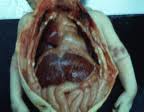Newborns are susceptible to infection because of their underdeveloped immune system. For that very reason, standards in hospital infection control should be strictly enforced starting at birth.
Hospital officials and personnel should be strict in applying standards in health care to avoid infection among the babies.
Neonatal sepsis is a serious bacterial infection in the blood that kills 8,000 newly born babies each year based on Philippine experience.
Standard in health care for babies should begin with safe cutting of the umbilical cord, immediately placing the infant with its mother, exclusive breastfeeding within an hour of birth, and moving in the baby with the mother thereafter.
The cord should be cut with a sterile blade and keep clean and dry. The three “cleans” should be strictly observed and practiced at all times: clean hands, clean perinea l area (genital area) and clean umbilical area.
Apart from maintaining a clean hospital environment, birthing women, birth attendants and others. Handling the baby should observe strict personal hygiene particularly hand washing.
Internal examination of the mother during labor and delivery should also be minimized and conducted by trained birth attendants, with clean hands and covered by sterile gloves according to the specialist’s advice.
The World Health Organization (WHO) has appealed to hospitals to tightened their infection control measures to avoid neonatal sepsis. The WHO has further advised that handling the baby and invasive intervention such as setting up intravenous lines should be conducted only when and where there is a proven need.
All equipment coming in contact with intact skin must be washed thoroughly. However, instruments contacting mucous membranes or non intact skin should be sterilized,boiled or chemically disinfected, and those penetrating the skin should be sterilized.
Initiation of breastfeeding in the first hour of birth is also a recommended preventive measure. Newborn should be placed on the mother’s bare abdomen or chest immediately upon birth.
“Family bacteria” on a mother’s body is “friendly” and immediate skin to skin contact of the baby and mother according to the medical specialist facilitates this bacteria or grow in on the baby and prevents unfriendly bacteria in attacking the infant.
The first milk that comes out of a mother’s breast called colostrum,is highly important and serves as the baby’s first immunization since it contains high concentration of nutrients and antibodies needed by newborns to resist infections.
Colostrum contains large number of immunoglobulin that help protect the mucous membrane in the throat, lungs and intestines from germs.
Leukocytes are also present to protect against harmful viruses.Colostrum also facilitates growth of beneficial bacteria that line the digestive tract to ward off infection.
Breastfeeding and rooming-in or placing the child with its mother can dramatically reduce the number of neonatal sepsis cases, the experts cited.
It was also noted in a study that ninety five percent of deaths caused by neonatal sepsis were prevented by breastfeeding and rooming-in.
Also significant in the study was an eighty nine percent reduction in the number of infants who showed signs of sepsis. It was also noted that those who were feed with animal milk or formula only were eighteen times more likely to get neonatal sepsis than those receiving breast milk.
Good prenatal care can also prevent neonatal sepsis as well as many other conditions that can endanger the newborn.
